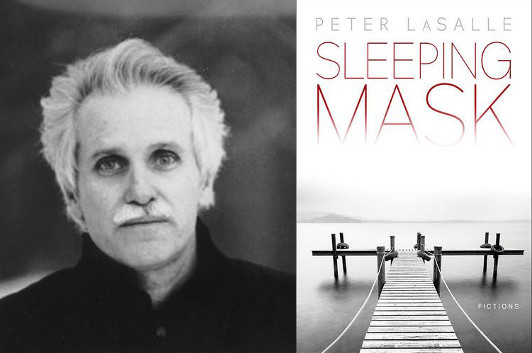Peter LaSalle’s Pursuit of Borges

photo: Alex S. MacLean
There’s some odd little moments in Peter LaSalle’s Sleeping Mask. And I’m not just thinking about the story where a man walks out of an airplane lavatory and slowly begins to realize he’s somehow wound up on an otherwise empty plane, still en route to… well, he’s not quite sure. There’s also the couple that dines at a restaurant in a Mexican border town and never realizes that it’s been taken over by a local drug lord, or the child soldiers who decide to kidnap the girls from a local orphanage and quickly find themselves no longer in charge of the situation. Even the more quotidian stories, like the day in the life of a university professor, have a detached, almost abstract quality to them. And then there’s the one about Edgar Allan Poe that’s a pitch-perfect academic paper… actually, that’s probably a good segue into this essay, where LaSalle pays tribute to another writer who liked to play with the boundaries between reality and fiction as well.
Well, when it comes to my inspiration as a short story writer, even awe, I often acknowledge the Argentine master of the genre, Jorge Luis Borges, and the collection Ficciones. It’s a book that by dint of sheer innovation—summoning the metaphysical, bravely and somehow magically pushing against the limits of past literature, a true clarion call announcing postmodernism—probably widened the possibilities of serious fiction forever after first appearing from a small Buenos Aires publisher in 1944.
I can admit it was a rather meandering road that eventually led me to such admiration. Oddly, I saw Borges before I’d ever read a word of his work. I was a Harvard sophomore in 1967 and my roommate was a fellow English major, a guy more sophisticated than me in matters literary (though one wonders how sophisticated either of us could be, he from a suburban Salt Lake City high school and I from an unknown private Catholic boys school, a pretty medieval operation, in the nowheresville of semi-rural Rhode Island). Excited, he told me that a very important writer was on campus to lecture that year, under of the auspices of the long-established and prestigious Charles Eliot Norton Lectures series. He assured me that this Jorge Luis Borges was a figure easily on par with Beckett and we must attend.
So one snowy Cambridge evening we set out together to Sanders Theatre, a big teacup of a lecture hall in the campus’s old, spookily turreted Memorial Hall. I watched a smiling blind man being led onto the stage; his hair was silvery, his black suit well tailored. He spoke with a rather antiquated British accent, and I know I didn’t understand much of what he said. My lack of comprehension wasn’t because of the accent but due to the fact that the content was obviously well beyond me at the time: deep insight concerning the mystery of metaphor, also the paradoxically illogical logic of dream in literature, etc.—such being some of his subjects, as I learned later when reading a book that transcribed those Harvard talks.
I guess what stuck with me at age 20, above all else, was the very image of him, elderly, blind, continuing to gently smile and erudite to a dazzling degree—he appeared nothing short of Homeric, an archetypical Poet and icon for Literature itself, all right.
24 April 2017 | selling shorts |
Sonia Taitz’s American Dream

photo: H&H Photographers
I first met Sonia Taitz back in 2012, when we recorded an episode of Life Stories to discuss her memoir, The Watchmaker’s Daughter. Since then, she’s been focusing on fiction, and her latest novel, Great with Child, actually explores some of the same psychological and emotional themes that she previously wrote about in autobiographical mode. But, here, let Sonia explain it…
The heroine of Great with Child is the daughter of two newcomers to America. Driven by her parent’s immigrant ambition, Abigail Thomas becomes a blindly competitive associate at a prestigious law firm. Her background provides a baseline for her personal and professional evolution through the course of the book. The catalyst for change is her accidental pregnancy, which throws all her certainties into question. My own trajectory led me from law to writing—and to writing this book in particular.
I’ve always proudly defined myself as the daughter of immigrants. And not just in the vague, melting pot American way, but as a first-generation child, born of refugees of World War II. My parents came out of war-torn Europe and sailed the ocean until they saw the Statue of Liberty. That statue meant everything to them, as did its poem, written by Emma Lazarus (also born of immigrants): “Give me your tired, your poor, your huddled masses yearning to breathe free.”
They were tired, they were poor; they had been huddled and incarcerated. Now, they were leaving the Old World to embark on the New. In their eyes, I was destined to become the embodiment of their American Dream, with all the security that entailed. Loving them as I did, I faithfully wanted whatever they wanted. It would be years before I could differentiate my wishes from theirs—or even knew what my own wishes were.
24 April 2017 | guest authors |

 Our Endless and Proper Work is my new book with Belt Publishing about starting (and sticking to) a productive writing practice.
Our Endless and Proper Work is my new book with Belt Publishing about starting (and sticking to) a productive writing practice. 
